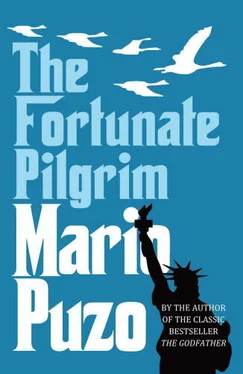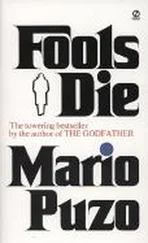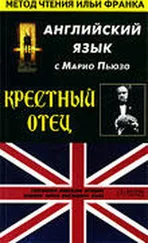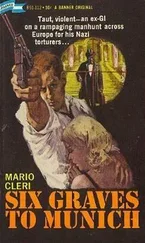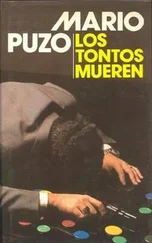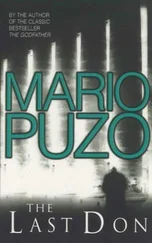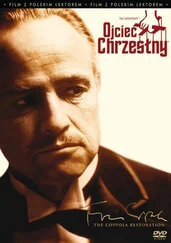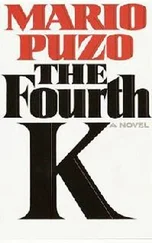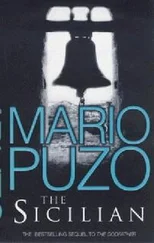For the clan of Angeluzzi-Corbo the magic time had come. The house on Long Island was bought, for cold cash, from people mysteriously ruined by the war. A two-family house, so that Larry and Louisa and their children could live in one apartment under the watchful eye of Lucia Santa. There would be separate, doored bedrooms for everyone, even Gino when he came home from the war.
On the last day Lucia Santa could not bear to help her children strip the apartment, fill the huge barrels and wooden boxes. That night, lying all alone in her bed, she could not sleep. The wind whistled softly through the window cracks that had always been shielded by drapes. Lighter patches of wall that had held pictures gleamed in the darkness. There were strange sounds in the apartment, in the empty cupboards and closets, as if all the ghosts of forty years had been set free.
Staring up at the ceiling Lucia Santa finally became drowsy. She put out her arm to trap a child against the wall. Falling into dreams she listened for Gino and Vincenzo to go to bed and for Frank Corbo to come through the hallway door. And where had Lorenzo gone again? Never fear, she told little Octavia, no harm can come to my children while I live, and then, trembling, she stood before her own father and begged linen for her bridal bed. And then she was weeping and her father would not comfort her and she was alone forever.
She had never meant to be a pilgrim. To sail a fearful ocean.
The apartment turned cold and Lucia Santa awoke. She got up and dressed in the dark, then put a pillow on the window sill. Leaning out over Tenth Avenue, she waited for light and for the first time in years really heard the railroad engines and freight cars grinding against each other in the yards across the street. Sparks flew through the darkness and there was the clear ringing of steel clashing on steel. Far away on the Jersey shore there were no lights because of war, only stars caught on the shade of night.
In the morning there was a long wait for the moving vans. Lucia Santa greeted neighbors who came to wish the family good luck. But none of the old friends came, none were left on Tenth Avenue. The Panettiere had sold his bakery when his son, Guido, came home wounded too badly for work. He had moved far out on Long Island, as far out as Babylon or West Islip. The mad barber with his houseful of daughters had retired; with so few male heads to cut because of the war, he too had moved out to Long Island to a town called Massapequa, near enough the Panettiere for a game of cards on Sundays. And others too had left for all those strange towns dreamed of for so many years.
Dr. Barbato, to everyone’s surprise, had volunteered for the Army and in Africa had become a hero of some sort, with his pictures in the magazines and a story of his exploits so terrifying that his father suffered a stroke from sheer exasperation at his son’s foolishness. Poor Teresina Coccalitti never moved out of her apartment, fiercely guarding the countless tins of olive oil and fat that would some day ransom her sons from death. Gino’s childhood friend, Joey Bianco, had in some clever fashion escaped the Army, no one knew how, had become rich, and bought a palace for his mother and father in New Jersey. So now it was really time for the Angeluzzi-Corbo family to leave.
FINALLY PIERO SANTINI came with his trucks from Tuckahoe. The war made such services dear to arrange, but Santini came as a favor to a native of his very own village in Italy. And because, mellowed now, it gladdened his heart to help the happy end to this story.
Lucia Santa had shrewdly left out a pot and some scarred cups. She gave Santini coffee and they drank it while looking down on Tenth Avenue, balancing their drinks on the window sill. Octavia and Sal and Lena carried light packages down to the waiting vans while two old muscular Italians, grunting like donkeys, let their backs be saddled with enormous bureaus and beds.
After a time the only thing left in the apartment was the backless kitchen chair deemed too worthless for the fine house on Long Island. Louisa and her three little children came up the stairs then to wait with them, the little villains wading through a sea of discarded clothing and the litter of stripped cupboards and left-over newspaper.
And then the final moment had come. Mr. di Lucca’s limousine, now Larry’s, was waiting in front of the tenement. Octavia and Louisa swept the little children down the row of dirty, deserted bedrooms and out the door. Then Octavia said to Lucia Santa, “Come on, Ma, let’s get out of this dump.”
To everyone’s surprise a dazed look came over Lucia Santa’s face, as if she had never really believed she must leave this house forever. Then instead of going toward the door, she sat on the backless kitchen chair and began to weep.
Octavia shooed Louisa and her children down the stairs before turning on her mother. Her voice was shrill, exasperated. “Ma, what the hell’s the matter now? Come on, you can cry in the car. Everybody’s waiting.” But Lucia Santa bowed her head into her hands. She could not stop her tears.
Then the mother heard Lena’s angry voice say, “Leave her alone”; and Sal, who never spoke, said, “We’ll bring her down, you go ahead.”
Octavia went down the stairs and the mother raised her head. Her two youngest children guarded her on each side. She had not realized they were so grown. Lena was very pretty, very dark, with her father’s blue eyes, but her face was like Gino’s. Then she felt Salvatore’s hand on her shoulder. He had the eyes of a man who could never get angry. In that moment the mother remembered how Sal and Lena, silent in their corner, had watched and surely judged them all. She could not know that to them their mother had been a heroine in some frightening play. They had watched her suffer the blows of fate, their father’s fury, her hopeless struggles with Larry and Gino and the terrible grief of Vinnie’s death. But as she reached out to touch their bodies she knew that they had judged her and found her innocent.
THEN WHY DOES Lucia Santa weep in these empty rooms? Who is better than her?
She goes to live in the house on Long Island, her grandchildren beneath her feet. Salvatore and Lena will become doctors or schoolteachers. Her daughter Octavia is a forelady in the dress shops, and her son Lorenzo is the president of a union, giving out jobs as grandly as a duke in Italy. Her son Gino is still alive while millions die. There will always be enough food and money for an old age surrounded by respectful and loving children. Who is better than her?
In Italy forty years ago her wildest dream had not gone so far. And now a million secret voices called out, “Lucia Santa, Lucia Santa, you found your fortune in America,” and Lucia Santa weeping on her backless kitchen chair raised her head to cry out against them, “I wanted all this without suffering. I wanted all this without weeping for two lost husbands and a beloved child. I wanted all this without the hatred of that son conceived in true love. I wanted all this without guilt, without sorrow, without fear of death and the terror of a judgment day. In innocence.”
AMERICA, AMERICA, BLASPHEMOUS dream. Giving so much, why could it not give everything? Lucia Santa wept for the inevitable crimes she had committed against those she loved. In her world, as a child, the wildest dream had been to escape the fear of hunger, sickness and the force of nature. The dream was to stay alive. No one dreamed further. But in America wilder dreams were possible, and she had never known of their existence. Bread and shelter were not enough.
Octavia had wanted to be a teacher. What had Vinnie wanted? Something she would never know. And Gino—what dreams he must have had, surely the wildest of them all. But even now through the tears, through the anguish, a terrible hatred rose, and she thought, Most of all he wanted his own pleasure. He had wanted to live like a rich man’s son. Then she remembered how she had broken her own father’s heart to win linen for her marriage bed.
Читать дальше
